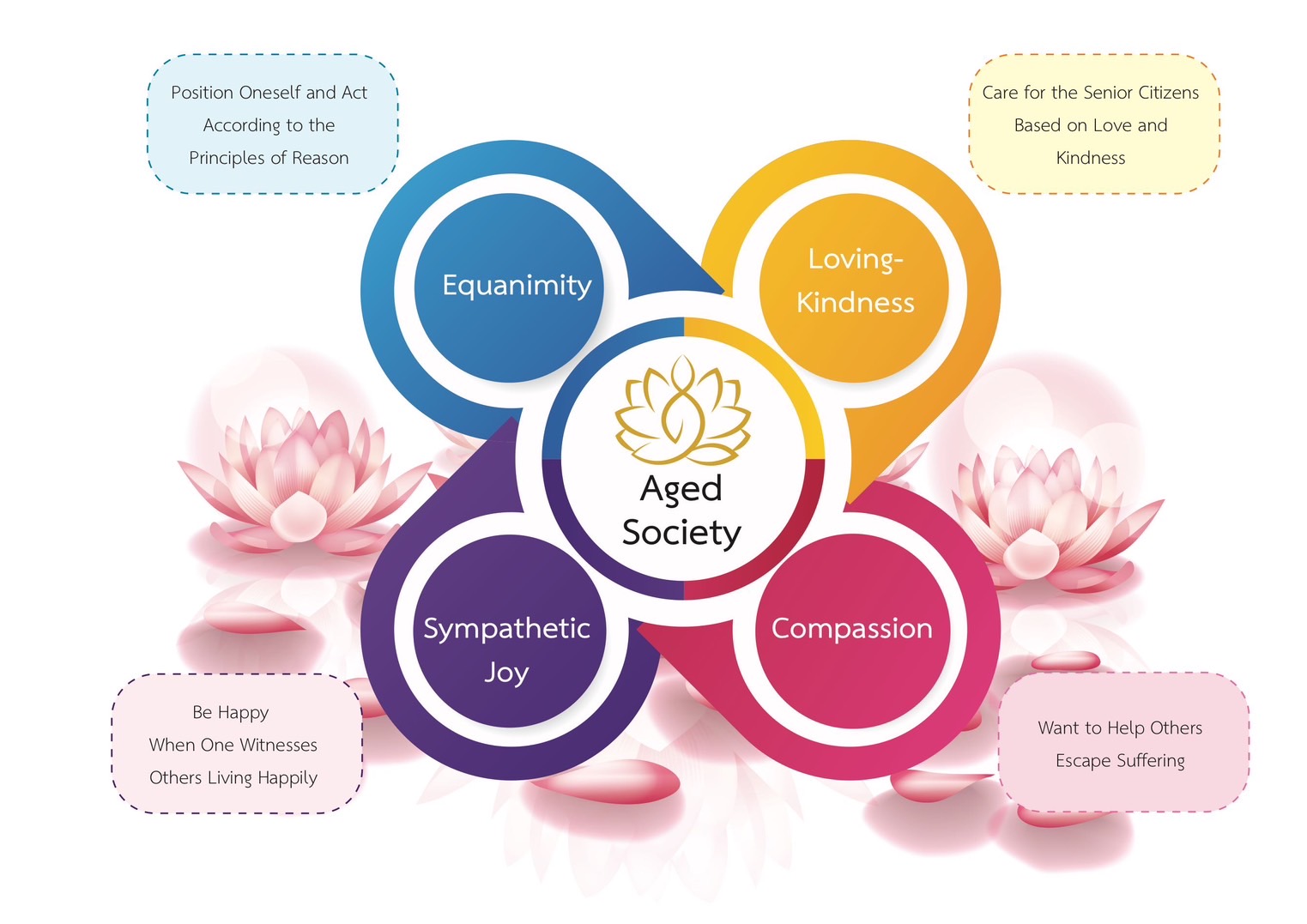DEVELOPMENT OF MODEL COMMUNITIES BASED ON THE PRINCIPLES OF BRAHMAVIHĀRA DHAMMA TO SUPPORT THE AGED SOCIETY
Keywords:
Community Development, Model Community, Brahmavihāra Dhamma, Aged SocietyAbstract
Background and Objectives: Currently, Thailand is becoming to be an aged society. Therefore, it is necessary to prepare for the care of the senior citizens in order to create a society for the senior citizens that promotes a good quality of life and proper care, including care from family, community, and the participation of all sectors from having a network for exchanging ideas of healthcare with the principles of Brahmavihāra Dhamma. It requires a model community that is suitable for the aged society. Therefore, developing a model community based on the principles of Brahmavihāra Dhamma that supports the aged society is according to the context and needs of senior citizens and the community. The objectives of this research consist of studying the development of a model community to support the aged society through community participation mechanisms and the integration of the principles of Brahmavihāra Dhamma to support the aged society.
Methodology: It is qualitative research. Key informants, a total of 16 persons, were purposively selected. The research tools included structured in-depth interviews. Data were collected from relevant documents and in-depth interviews.
Main Results: The following results were found: 1) The development of an age-friendly community through community participation mechanisms included providing knowledge about the health of the senior citizens, such as providing information on food choices, reducing sugary, salty foods, or foods that might have led to complications after illness, and providing basic knowledge on appropriate food selection and basic health care for senior citizens. It also involved organizing comprehensive activities for the care of senior citizens, such as surveying senior citizens at risk of diabetes and high blood pressure, to developing a network to promote health care for the senior citizens, and supporting the active participation of senior citizens in self-care for their health; and 2) The principles of Brahmavihāra Dhamma in supporting the aged society through community participation mechanisms was to use Buddhist principles to help maintain emotional connection with senior citizens consisted of: In terms of Mettā, it fostered mutual respect and good intentions; in terms of Karuṇā, it was important to help senior citizens feel valued and significant; in terms of Muditā, it provided opportunities for interaction, exchanged ideas, and promoted relaxation, which could have helped reduce social isolation and enhanced the sense of pride and self-confidence in senior citizens; and in terms of Upekkhā, it consisted of trust, which was a central factor in promoting the understanding and awareness of one's own feelings, self-control, relaxation, and acceptance of the realities of life.
Involvement to Buddhadhamma: Integrating the principles of Brahmavihāra Dhamma for supporting the aged society is closely related to the Brahmavihāra Dhamma or the Four Brahmavihāras, consisting of Mettā, Karuṇā, Muditā, Upekkhā which are fundamental principles in Buddhism. These teachings guide individuals to behave in a virtuous manner, enabling them to live together happily in their daily lives, especially for the well-being of the senior citizens. Moreover, these principles can also be applied by leaders to create happiness for others.
Conclusions: Taking care of the senior citizens was currently considered important due to the increasing proportion of senior citizens in Thai society. This led to health issues, mental health problems, and the occurrence of various chronic diseases when the senior citizens did not have work, which might have resulted in symptoms of depression. However, promoting the involvement of families and communities in taking care of the senior citizens would have helped reduce the burden of care from the government.
References
Chansarn, S. (2020). Active Ageing of Elderly People and Its Determinants: Empirical Evidence from Thailand. Asia-Pacific Social Science Review, 12(1), 1-18.
Cronbach, L. J. (2019). Essentials of Psychological Testing (5th ed.). Harper: Collins Publishers.
Faikam, K. (2018). Quality of Life Development of the Elderly in Thailand. Journal of Bangkokthonburi University, 7(2), 19-26.
Kongkaeo, W. (2016). Biosocial Factors Effecting Health Perception and Health Selfcare Behavior of the Elderly at Senior Citizen Club of Pramongkutklao Hospital in Bangkok Metropolis. [Unpublished master's dissertation]. Srinakharinwirot University.
Naiyapatana, W. (2010). Health problem, Medicine-Used problem, and Medicine-Used Behaviors among Elderly In the community of Pramongkutklao Hospital. Journal of Nursing and Education, 3(1), 2-14.
Phangnarean, P. (2021). Community Participation in Career Development for Increasing the Elderly's Incomes. Dhonburi Rajabhat University Journal, 15(1), 112-121.
Phramaha Suphan Subhaddo. (2021). A Study of the Buddhist Principles for Promotion of Mental Health of the Elderly in Huai Rat Sub-District, Huai Rat District, Buriram Province. [Unpublished master's dissertation]. Mahachulalongkornrajavidyalaya University.
Pruansuk, P. (2017). Guidelines for Quality of Life Development for the Elderly of Local Administrative Organizations in Phrae Province. Journal of Graduate School, Pitchayatat, 10(1), 77-87.
Sarana, T. & Pasunon, P. (2017). Dharmic Principle for Lifestyle of the Elderly: A Case Study of Community at Wat Si Mueang, Chanthaburi. [Unpublished master's dissertation]. Silpakorn University.
Srisupak, R. (2016). Health Care Model for Homebound Elderly in Mahasarakham Municipality. [Unpublished master's dissertation]. Mahasarakham University.
Sritanyaratana, W. & Damrikarnlerd, L. (2010). Knowledge Management and Synthesis of Practices of District Health Promoting Hospitals: Guidelines for Elderly Services. Vol.1. Sahamit Printing and Publishing Press.
Wanitchakham, A. (2019). Preparation for Aging Society: A Case Study of Sai Mai District, Bangkok. APHEIT Journals, 25(1), 164-179.
Zhan, L. (1992). Quality of Life: Conceptual and Measurement Issues. Journal of Advanced Nursing, 17(7), 795-800.

Downloads
Published
How to Cite
Issue
Section
License
Copyright (c) 2024 Journal of Buddhist Anthropology

This work is licensed under a Creative Commons Attribution-NonCommercial-NoDerivatives 4.0 International License.








